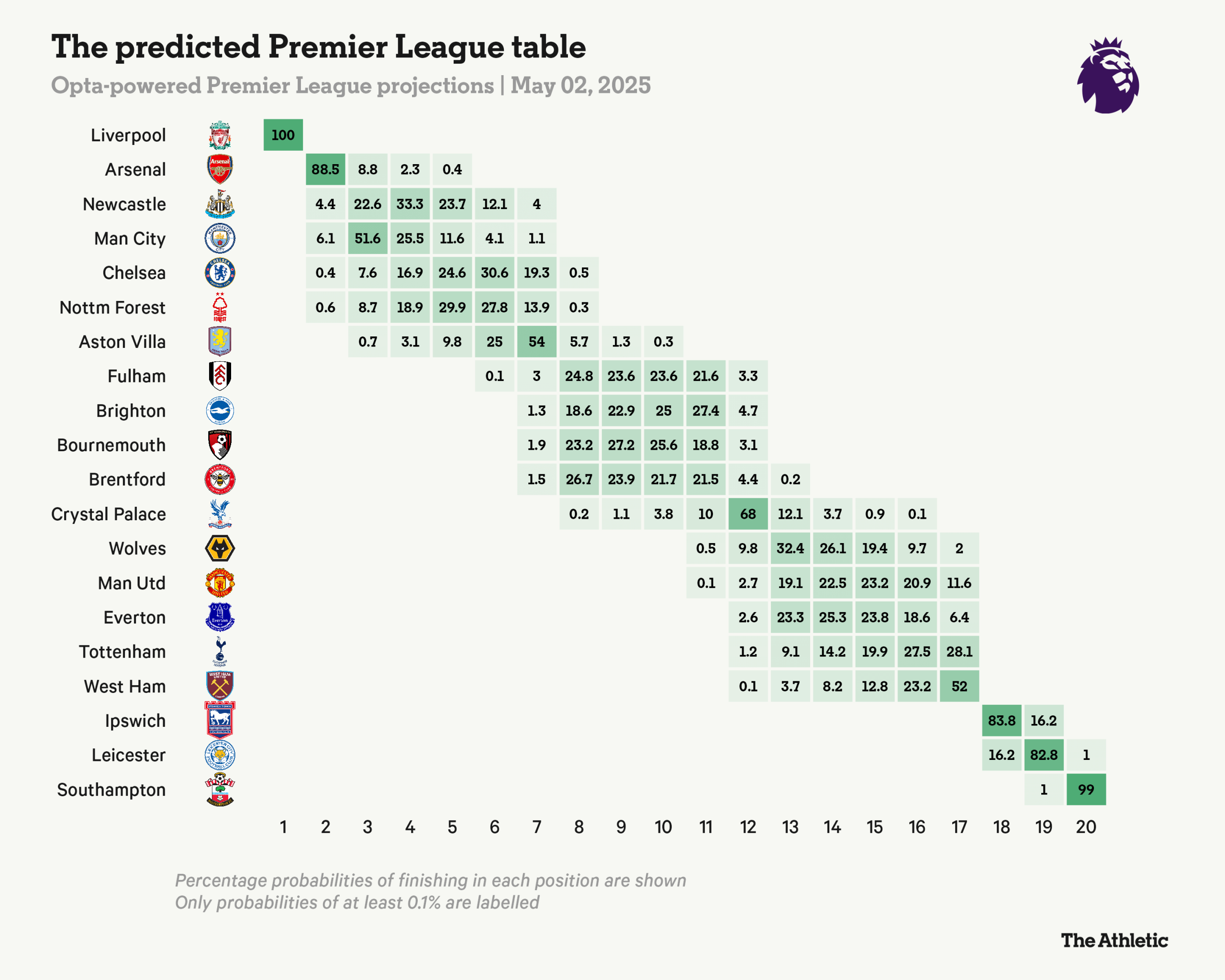
It was another decent week for the Premier League sides still engaged in European competition.
Arsenal may have lost 1-0 to Paris Saint-Germain on Tuesday but two days later there were comfortable wins for Manchester United and Tottenham Hotspur in their Europa League semi-final first legs, while Chelsea’s seemingly serene procession to UEFA Conference League glory continued with a 4-1 first leg win against Djurgarden. It increases the intriguing prospect of an all-English Europa League final between two sides in the bottom half of their domestic league, which could be very useful for qualification purposes.
Advertisement
But just how many sides will represent England across UEFA’s three competitions next season?
With so many moving parts it’s not exactly a simple question to answer, but here goes.
How many Champions League slots are available?
This used to be a simple one, didn’t it? After all, there’s a reason ‘finishing in the top four’ has firmly become part of the English football lexicon. But things have changed, possibly more than you think.
First, there was the news that the Premier League had secured one of UEFA’s two European Performance Spots (EPS), awarded to the two domestic leagues who have performed most successfully in coefficient terms during 2024-25. So that’s now five Champions League berths for the Premier League, hence the focus on the gripping top-five battle that’s currently in progress.
But it doesn’t end there. The winners of the Europa League also get a Champions League place for the following season, and there are two Premier League sides in the semi-finals of that competition, with both sides — Tottenham Hotspur and Manchester United — more likely to finish 17th than they are to finish in the top half.
So you’re saying we could have a Champions League play-off between Spurs and United in Bilbao next month?
I suspect UEFA would still prefer it to be called ‘The 2025 Europa League final’ but yes, that situation seems very likely after the two clubs won their semi-final first legs on Thursday night, 3-1 and 3-0 respectively.

United beat Athletic Club 3-0 in their Europa League semi-final first leg (Clive Brunskill/Getty Images)
So that’s six Premier League teams in the Champions League next season?
Well, yes… but it could be seven.
Wait, what?
You need to remember that the EPS position is a separate route into the Champions League than the standard top four, so if Arsenal finished fifth — as they mathematically still could — but won the Champions League (again, still a possibility) then the EPS award would go to the team in sixth place. Combine that with a Premier League team winning the Europa League and England would then have seven representatives in what used to be known as the European Cup in 2024-25: the top four, defending champions Arsenal, sixth place plus one of Manchester United or Tottenham.
Advertisement
That would mean 19.4 per cent of sides in next season’s Champions League would be from the Premier League
Good maths but, as I say, file under: extremely unlikely. Let’s just say that it’s definitely five qualifiers for the Champions League, and, after the events of this week, probably six.
What about the other European competitions?
Usually, English football gets three other European spots, two in the Europa League and one in the UEFA Conference League. The Europa League berths are handed to the FA Cup winners and the highest Premier League finisher who doesn’t qualify for the Champions League. Then the Carabao Cup winners get the Conference League spot.
So that’s nine, possibly 10 Premier League sides in Europe next season…
You’d think so, but guess what, it’s not quite as simple as that. First, Newcastle won the Carabao Cup but look increasingly likely to qualify for the Champions League via their league position, so that Conference League place switches to a Premier League finisher. Then we have the two teams remaining in this season’s FA Cup.
Manchester City are in the same situation as Newcastle. They’ll take the domestic cup win — enjoy it even — but are aiming for a top five finish and thus a route back into the Champions League. If they do so then their Europa League spot for winning the FA Cup will switch to a Premier League finisher.
Their Wembley opponents, Crystal Palace, should just focus on winning the cup and qualifying for the Europa League the way God, or rather UEFA, intended.

Crystal Palace will face Manchester City in the FA Cup final (Richard Heathcote/Getty Images)
What happens if Chelsea win this season’s Conference League?
The winners of the Conference League get a spot in the following season’s Europa League (meaning football has its own version of snakes and ladders where a club can theoretically win the Conference League, Europa League and Champions League in successive seasons, all while not worrying about their domestic league position, but that’s not something we need to concern ourselves with now), but Chelsea are aiming to qualify for the Champions League, in which case their Europa League berth as Conference League winners will not be taken up.

Can we work through some hypotheticals here?
Let’s imagine a situation where Premier League sides finish in the position Opta predict them to in the graphic above, plus Manchester City win the FA Cup, Manchester United win the Europa League and Chelsea win the Conference League. In that scenario, next season’s European spots will be distributed as follows:
Champions League: Liverpool, Arsenal, Manchester City, Newcastle, Chelsea, Manchester United
Advertisement
Europa League: Nottingham Forest, Aston Villa,
Conference League: Fulham
That would be nine Premier League sides in European competition next season. Not quite the 10 that France’s Ligue 1 provided in 1997-98, but still a lot.
Hang on, shouldn’t we get three Europa League spots if Chelsea win the Conference League?
Well, we would if Chelsea win the trophy and finish too low in the Premier League table to qualify for Europe by that method, but that is looking increasingly unlikely. If Chelsea were to come seventh and win the Conference League then they would enter next season’s Europa League as holders of the former competition and the two ‘standard’ Europa League places (assuming Manchester City win the FA Cup) would be applied to the teams finishing sixth and eighth, with the Premier League giving up its usual Conference League place.
Now, if Chelsea were to finish eighth then the normal Conference League place comes back into play, meaning the sixth and seventh would be Europa League qualifiers, Chelsea would get into the UEL as Conference League winners and ninth place in the Premier League would be a path into the Conference League (so 10 teams overall). But Enzo Maresca’s side are nine points ahead of eighth with four games remaining, so this all feels very unlikely — even if Chelsea do have a tough run of fixtures to end the season.
So you’re saying the battle for eighth is the new battle for fifth?
Very much so, unless Palace spoil everyone’s fun by winning the FA Cup a week before the Premier League ends. But if not, then essentially Fulham (51 points), Brighton (51), Bournemouth (50) and Brentford (49) are fighting it out to finish eighth and qualify for Europe.
This is way more exciting than I imagined
Yes, it is.
(Top photo: Getty Images)
This news was originally published on this post .











Be the first to leave a comment